How to get away with QA Manager’s Failures [Testμ 2023]
LambdaTest
Posted On: August 24, 2023
![]() 7227 Views
7227 Views
![]() 17 Min Read
17 Min Read
How often do you make mistakes in your day-to-day work? Were there any failures that affected not only you but also the whole team that you lead? Have you ever wondered how to turn any failures into opportunities?
In this session, our speaker, Dmytro Lukianchuk, answered all these questions. As a young QA team lead, he shares his top 10 personal and professional failures. These are the failures that changed the way he works and thinks today. And guess what? It’s not just about the mistakes – it’s about how to transform them into lessons.
About the Speaker
Dmytro Lukianchuk is a Ukrainian professional who embarked on his journey as a Quality Assurance (QA) specialist in 2010. Over the years, he has gained extensive expertise in various areas, including Manual QA, Automation, leadership, and management.
Dmytro has actively participated in testing products used by millions of users in more than 100 countries around the world (Payments by Wix) and has been part of building the rock star team that created these products. Moreover, he has played a crucial role in assembling and leading a highly talented team that was instrumental in creating these exceptional products.
Presently, Dmytro is responsible for managing a team comprising ten skilled QAs. He is passionate about people and helping them grow professionally and overall.
If you couldn’t catch all the sessions live, don’t worry! You can access the recordings at your convenience by visiting the LambdaTest YouTube Channel.
Session Overview
Kicking off the session, Dymtro discussed his journey of overcoming the fear of failure in his role as a manager. He acknowledged his past mistakes and highlighted the importance of taking action.

Dymtro shared a simple yet powerful formula that he believes has always helped him achieve success: “The first step is to try, followed by not fearing failures, then analyzing and adjusting after failure, and finally, trying again in a new way.” He expressed his readiness to learn and grow, even in his current speaking engagement, as it was his first time as a speaker, and encouraged the audience to embrace this approach in their leadership and management roles.
Moving forward, Dymtro shared his failures as a QA manager, the lessons learned, and the methodologies adopted to correct them.
#1. Don’t Trust Your Teammates
Dymtro began by admitting that one of his top ten failures was not trusting his team members when transitioning into a leadership role. He described a scenario where he was asked to lead a team of five individuals who were senior-level professionals.

In this new leadership role, Dymtro admitted to being unsure about the team leader’s responsibilities and tasks. Instead of fully embracing the leadership aspect, he defaulted to what he was comfortable with, which was testing products. He believed he was chosen as a leader because of his testing expertise.
However, instead of focusing on leadership tasks and responsibilities, he started closely monitoring and critiquing the work of his team members. Even though they were experienced senior professionals, he began questioning their testing approaches, methods, and choices. He worried their work might not meet his personal and company’s quality standards.
This micromanagement style led to a lack of trust within his team. His actions made his team members feel he did not trust them to do their jobs effectively. It created a tense and uncomfortable atmosphere within the team.
Dymtro also mentioned that he even selected one team member as a “victim” for his micromanagement approach, closely monitoring and controlling every aspect of that person’s work. This caused significant stress and frustration for the team members and resulted in a conflict within the team.
The turning point came when they seriously discussed the micromanagement issue. Dymtro realized that micromanagement was a trap and it was detrimental to team dynamics and trust.

From this failure, Dymtro learned a crucial lesson: Trust is the foundation for everything in a team. He realized that building something long-term and effective without trust is challenging, especially in a leadership position. He emphasized the importance of addressing issues openly and immediately to prevent conflicts from arising.
Additionally, he acknowledged that there are often multiple right ways to solve a particular problem or task, and his way was not the only correct one. This realization encouraged him to be more open to different approaches and solutions.
Further, during his session, Dymtro conducted a poll to better understand his audience’s occupations.

The poll revealed a diverse audience, including general software development engineering testers, manual and automation testers, and a significant percentage of managers and leaders. This information allowed him to tailor his talk to cater to the interests and needs of his varied audience.
#2. Radical Methods are always Accepted
Dymtro shared a situation as a lead where he faced a common dilemma in software development: the tension between the business side, which often pushes for faster releases and quicker user feedback, and the engineering side, which values product quality and stability.
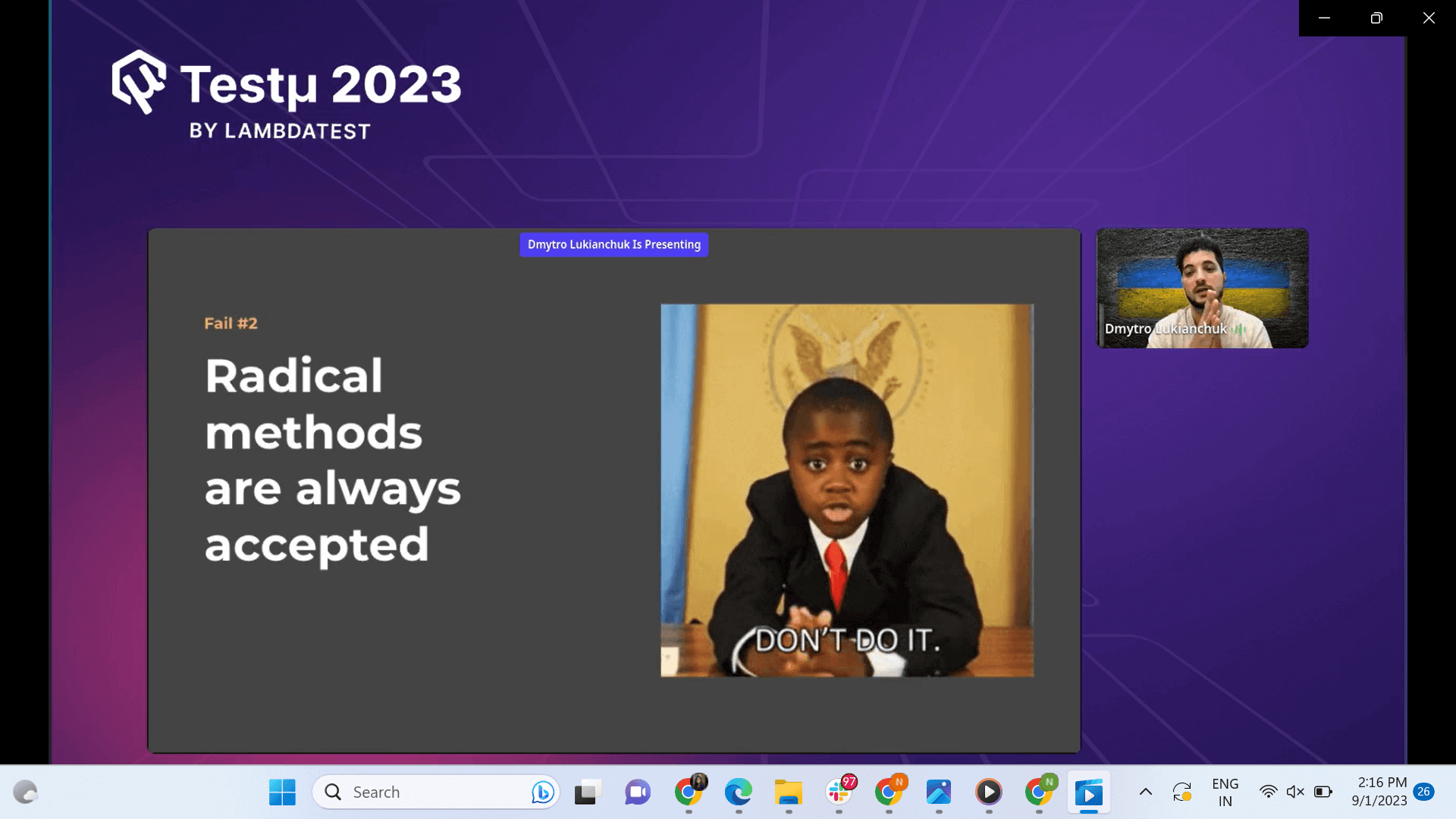
Dymtro felt frustrated because there wasn’t enough time allocated for automation tasks. It’s a situation familiar to many in the field where automation is often postponed because it can be done later. He took a radical approach to highlight the importance of automation and its impact on product quality.
He chose a recently released product that automated tests had not covered due to the lack of allocated time. In a meeting with stakeholders, including developers, he asked them a critical question: “Are you aware of the quality of the product without automation coverage?” When met with silence, he showed them a slide with a shocking image to provoke an emotional response.

His approach worked, and the R&D leadership forum understood the issue and agreed to change their attitude toward automation. This part of his story was a success.
However, he failed in how he communicated this success to his team. He presented the same information to his team, including the controversial slide, but he hadn’t considered that one of his team members, a relatively new QA, had worked on the project and was responsible for its quality.
The new team member took the presentation personally, feeling responsible for the quality issues raised in the meeting. This created tension within the team, and Dymtro realized that his approach was insensitive and could have cost him a valuable team member.

From this experience, Dymtro learned the value of empathy and considering how his actions might affect others before making radical moves. He recognized that radicalism isn’t always the best approach and that it’s essential to communicate and involve the team in decisions that directly impact their work and morale. This incident taught him to be more sensitive to his team members’ feelings and perceptions as a leader.
#3. (Don’t) Ignore Your Gut Feelings
Dymtro shared an experience with the audience where a candidate was hired for a senior position in his team. Despite having a strong gut feeling that the candidate might not be suitable, he didn’t raise his concerns due to time constraints. He hoped that, with time, the candidate would improve and become a good fit for the team.

However, after the candidate started working, Dymtro’s gut feeling was validated as negative feedback about the candidate’s performance started pouring in from various sources. Dymtro realized that he should have trusted his initial intuition and acted on it. Ultimately, when the candidate left the team, it was a relief for everyone.
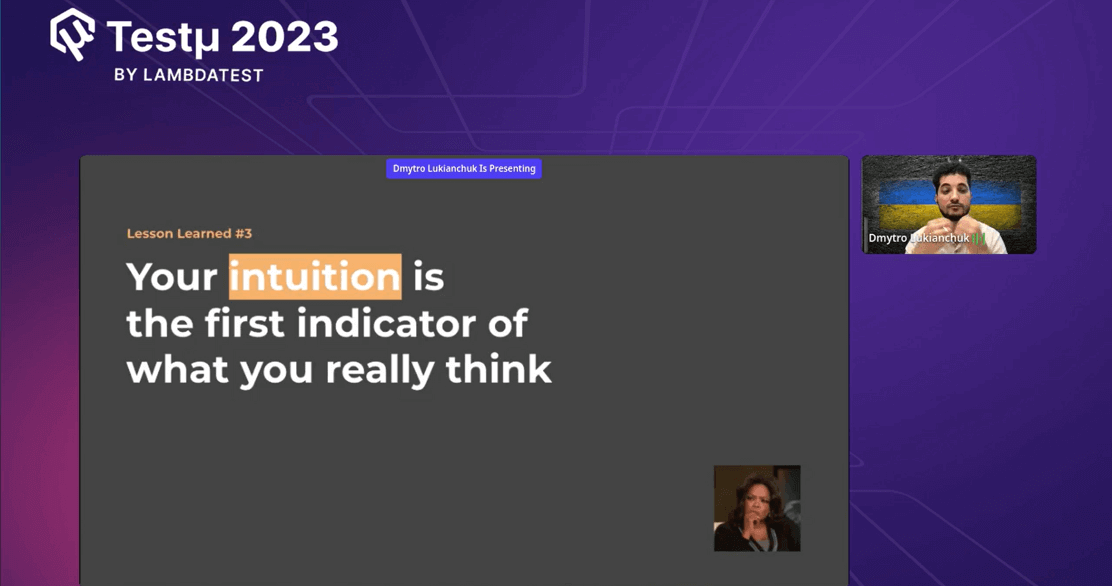
This experience taught Dymtro to trust his intuition more and recognize that gut feelings often indicate genuine concerns. He acknowledged that his intuition could be a valuable tool for hiring and firing decisions.
#4. (Never) Juggle Multiple Roles
Going ahead with the session, Dmytro talked about the challenges of juggling multiple roles simultaneously and its toll on his well-being. He shared how his manager noticed his struggles while performing multiple roles and encouraged him to choose a growth path in management or engineering. He wanted Dymtro to focus on one role to avoid burnout and frustration.

Further, Dymtro acknowledged that focusing on and mastering one role completely is much more valuable than performing ten roles simultaneously.

Dymtro reflected on the lesson that he couldn’t be “almighty” and that it’s better to excel in one role than to spread oneself thin across multiple responsibilities.
#5. You Always Know What to Do
While talking about his 4th failure, Dmytro recalled a time when he faced transitioning into a team lead role and the importance of understanding and meeting the expectations of various stakeholders.

Dymtro initially celebrated his promotion to a team lead position, enjoying the newfound freedom and autonomy of the role. However, he quickly realized that being a team lead meant more than just setting his tasks and focusing on his interests. His manager posed questions about the team’s strategic plan for the next year and inquired about the well-being and growth of team members, which caught Dymtro off guard.
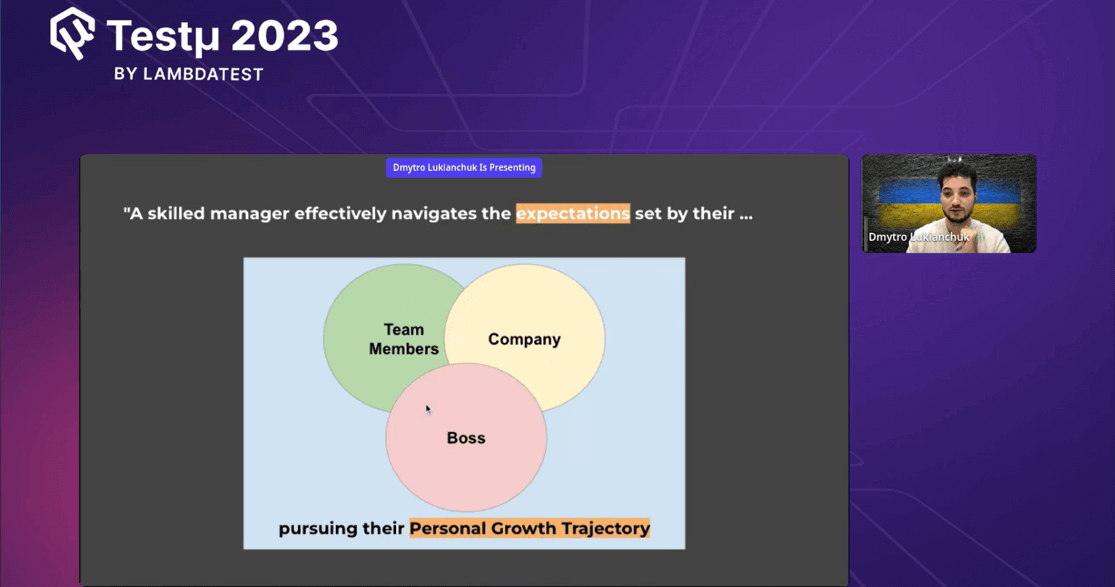
He then introduced what makes a skilled manager – someone who effectively manages the expectations of their team members, the company, and their direct supervisor while guiding the team toward their personal growth trajectories. Dymtro emphasized the need to seek out expectations and feedback from all stakeholders. He used a real example from his own experience, where he created a Google document to gather feedback and expectations from team members, the company, and his boss. This document had sections for “Keep doing,” “Start doing,” and “Stop doing.”
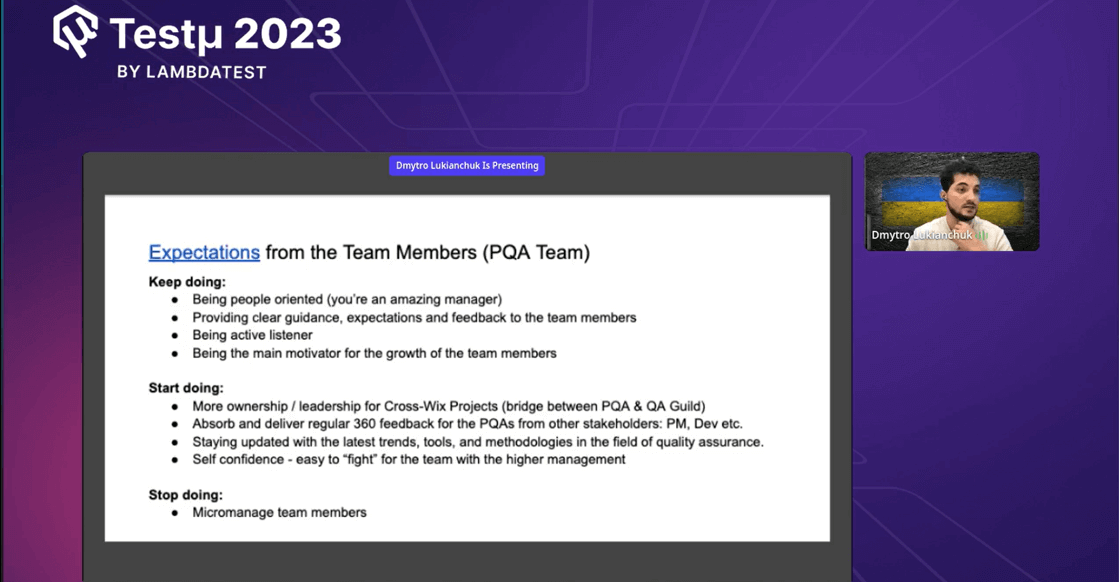
Dymtro highlighted the lesson he learned from this exercise. It helped him assess his current skills, build a backlog of strategic tasks based on expectations, and ultimately understand what was expected of him as a team lead. By actively seeking out and addressing these expectations, he was better equipped to perform effectively in his leadership role.
#6 Feedback is not that Important
Dymtro addressed the issue of asking for a salary increase or raise, focusing on the importance of feedback and performance evaluation.

He shared a situation where one of his subordinates requested a salary review after working with the company for a year. Initially, Dymtro considered the request without much evaluation, thinking that a year was a sufficient reason for a raise. However, when he discussed this with his manager, he was challenged with questions about his subordinate’s performance, growth, and contributions to the team and company. Dymtro’s manager asked him to write a justification email for the salary review, which proved challenging because Dymtro had not been actively evaluating his subordinate’s work.
Dymtro recognized that he had often ignored or postponed evaluating his team members’ work because he didn’t know how to do it effectively. He admitted that relying on time served as a proxy for performance, which he later realized was inadequate.
To address this issue, Dymtro and his team started building personal development plans for each team member. This helped him and the team members track progress more effectively and understand what areas needed improvement. Additionally, Dymtro attended feedback training sessions to learn how to provide and receive feedback effectively.

The key lesson here is that feedback and performance evaluation are crucial for personal and professional growth. Dymtro emphasized that feedback is important not only for salary discussions but also for overall development. It helps team members understand their progress, areas for improvement, and contributes to their growth.
#7. Don’t Show Your Cards to Your Team Members
Dmytro shared an instance with everyone to highlight this failure for an understandable approach.

As a team leader, Dymtro found himself in a privileged position where he had access to insider information about the company and was invited to important meetings, including those with high management. Initially, he considered keeping this information to himself, viewing it as a perk of leadership. However, he recognized that such behavior resembled what’s known as “Seagull Management,” where a manager drops in with half-baked ideas, demands immediate action, and then disappears, leaving the team to deal with the consequences.
@LDimchik briefly touches upon the concept of Seagull management, where managers intervene only during perceived issues, often resulting in hasty decisions and messy outcomes that others must handle and does it affects their team.#TestMuConf pic.twitter.com/FsZ2T5sAzB
— LambdaTest (@lambdatesting) August 24, 2023
To address this issue and avoid becoming a “Seagull Manager,” Dymtro turned to Simon Sinek’s book “Start with Why.” He realized that starting any task or decision was essential by answering the question “why” as a team. This approach allowed everyone to understand the purpose and significance of the task before jumping into the “how” and “what.” By starting with “why,” Dymtro encouraged his team to be part of something meaningful and influence decisions.
Dymtro emphasized the importance of being honest and open with the team, sharing information even if it was raw. He clarified that he wasn’t suggesting sharing confidential or sensitive information but rather the information that could foster trust and understanding within the team. By being honest and approachable, he could communicate with his team members as equals and friends rather than merely as a boss.

The key lesson here is that transparency and open communication are vital for effective leadership. By involving the team in the decision-making process and providing clear reasons behind tasks, leaders can create a sense of purpose and collaboration within the team. This approach helps prevent the negative aspects of Seagull Management, where decisions are imposed without context.
#8. (Never) Decide Alone
Dymtro talked about a situation where he switched the team’s automation tests from the Selenium Java framework to JavaScript. He had a strong background in Java but felt less confident with JavaScript, especially because his managerial tasks consumed more of his time. Despite this, he quickly decided during a meeting to adopt the JavaScript automation architecture. However, this decision didn’t sit well with his team.

Reflecting on this experience, Dymtro realized that his approach to decision-making was flawed. He questioned whether his title as a leader meant he had to make all decisions without consulting his team. He recognized the potential benefits of seeking advice and input from his team members, even if it meant admitting his limitations or acknowledging that others might have more expertise in certain areas.
Dymtro referred to a quote from Steve Jobs, emphasizing the importance of hiring smart people not to tell them what to do but to leverage their expertise and let them guide decisions. He explained that he began communicating with people in various positions, both inside and outside his team, to share his thoughts, listen to theirs, and ask for advice. This approach allowed him to gain a broader perspective and receive honest, critical feedback that often helped him adjust his final approach.
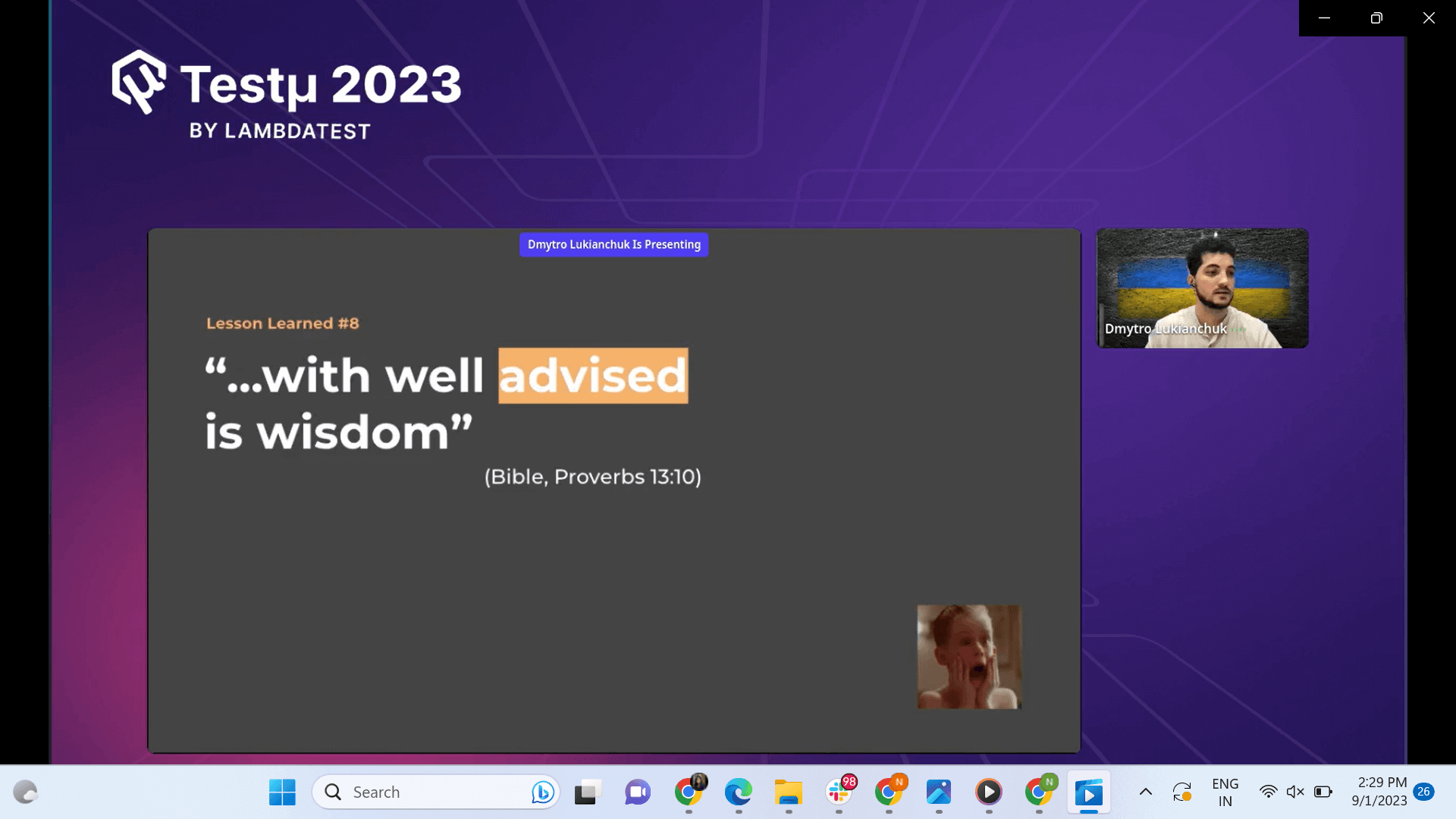
The key lesson here is that leadership doesn’t require making all decisions in isolation. Seeking advice and input from team members, regardless of their position, can lead to more informed and effective decisions. It’s not a sign of weakness but a recognition that a collective effort often results in better outcomes.
#9. Your Team is Always with You
Dymtro shared a critical lesson about team development and the responsibility of both team members and leaders for individual growth.

Dymtro began by describing a scenario where he had been working in a leadership position for some time and felt that everything was running smoothly within his team. However, he was surprised one day when one of his most experienced team members expressed his desire to become a developer, a role quite different from what he had been doing. This unexpected development made Dymtro realize he had failed as a manager because he was unaware of his team member’s growth aspirations.
Dymtro then polled the audience to gauge their opinions on who is responsible for their professional growth. The majority of respondents believed that they were primarily responsible (50%), while a smaller percentage thought their manager was responsible (9%), and some believed it was a shared responsibility (33%). Dymtro emphasized that his view was 50-50, with half of the responsibility lying with team members and the other half with the manager.
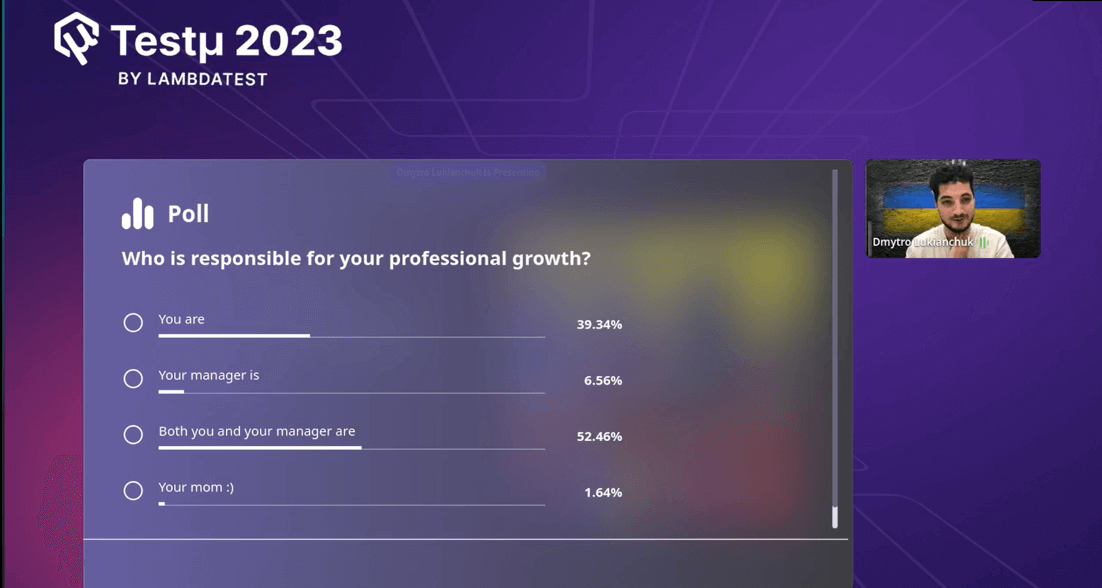
He explained that team members must take the initiative to express their development interests and ambitions to their leaders. To grow, they must communicate their goals and demonstrate their commitment to achieving them. On the manager’s part, they should provide regular feedback, identify strengths and weaknesses, and actively look for growth opportunities within the company. Dymtro viewed this as a win-win situation: team members get the desired growth, and the company benefits from their development.
Dymtro highlighted the importance of creating an environment where team members can thrive and develop. He emphasized that even if a team member only stays for a year and grows during that time, it’s still a success story. However, if team members aren’t growing under a leader’s guidance, it’s a negative sign that reflects poorly on the leader’s effectiveness in the eyes of the company’s management.

The lesson here: both team members and leaders share responsibility for professional growth. Team members must proactively express their goals, while leaders should provide guidance and opportunities. This collaborative effort results in individual growth and benefits the entire team and company.
#10. Business is (not) First
In Dymtro’s final failure, he shared a poignant story highlighting the importance of empathy in leadership and the significant impact personal life can have on work.

Dymtro recalled a meeting with one of his team members, Max, where Max responded to his questions very briefly and without emotion. Dymtro sensed that something was wrong but didn’t inquire further. Later, he ran into another colleague, Mykola, who was close to Max, and Mykola asked if Max was okay, mentioning that Max’s family was in a dire situation due to the ongoing war in Ukraine.
Dymtro realized that he hadn’t shown empathy or inquired about Max’s well-being during their previous conversation, which was focused solely on work. He recognized this as a failure because, in his view, personal life and work are intertwined, and it’s crucial for a manager to be sensitive and empathetic to their team members’ personal situations.
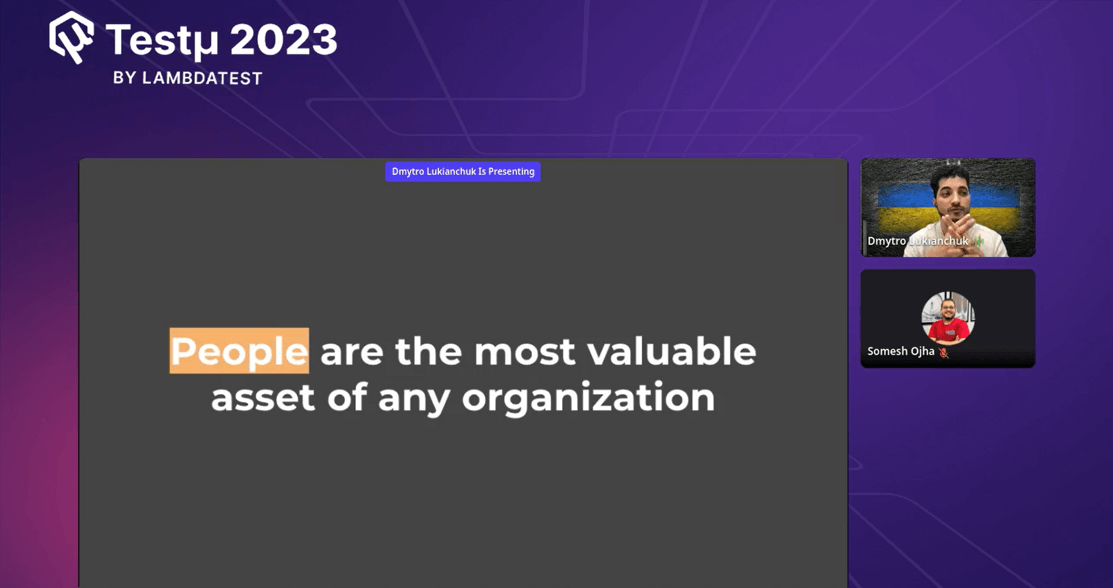
He stressed the importance of building friendly relationships with team members and being empathetic because people are a company’s most valuable asset. Dymtro shared that his empathetic approach had helped many of his team members endure the challenges of remote work during the COVID-19 pandemic and the war in Ukraine, all without leaving the company.
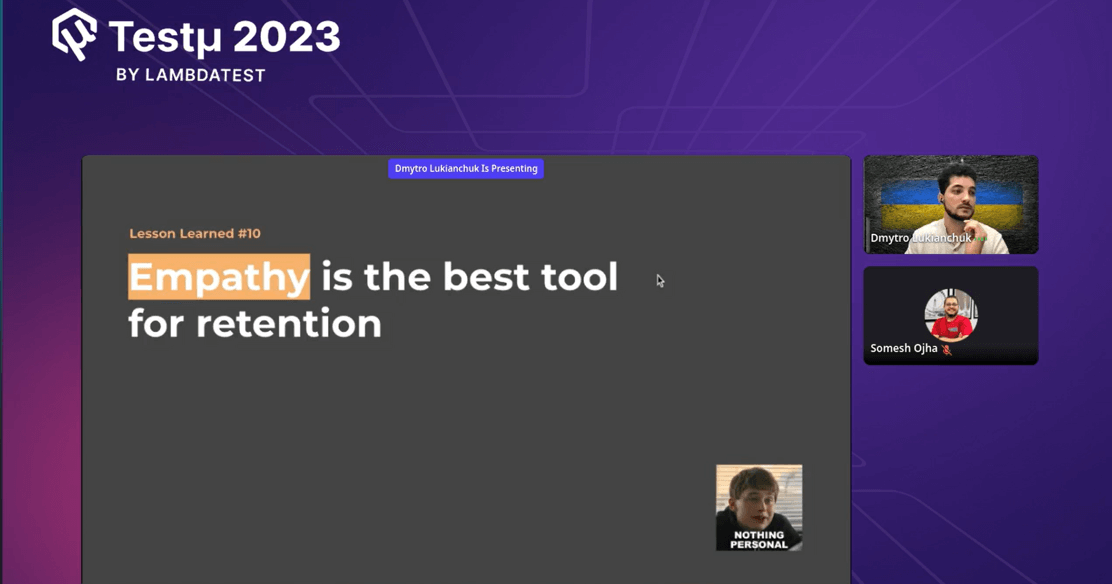
Dymtro emphasized that empathy is a powerful tool for retaining organizational talent.
This lesson shows that empathy and understanding are essential qualities for leaders to cultivate, as they contribute significantly to team morale, well-being, and overall success.
He concluded his talk by reiterating that failures only remain failures if one does nothing about them. He encouraged the audience not to be afraid to try new things and to seek workplaces and managers with an empathetic mindset.
Have a question? Feel free to drop it on the LamdaTest Community.
Got Questions? Drop them on LambdaTest Community. Visit now














